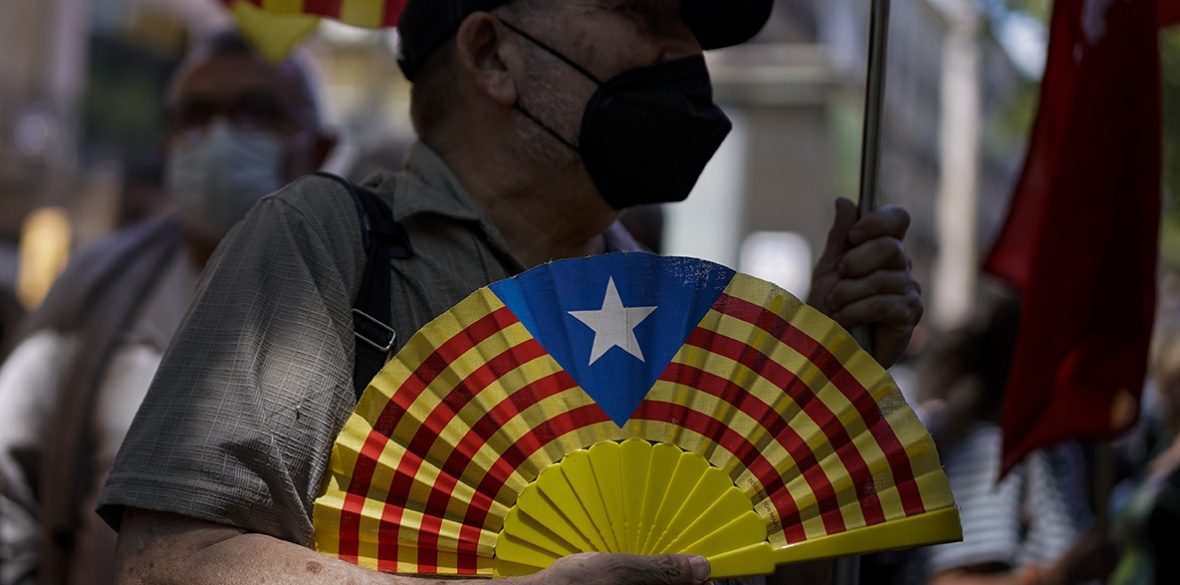This is the last article you can read this month
You can read more article this month
You can read more articles this month
Sorry your limit is up for this month
Reset on:
Please help support the Morning Star by subscribing here
SPAIN’S Socialist Party-led government’s decision to release jailed Catalan politicians should be welcomed by all democrats, regardless of their view on Catalan separatism.
As United Left spokeswoman Sira Rego puts it, this helps return the Catalan question to “the field of politics.”
This is a significant change in attitude from Madrid, which has previously depicted independence supporters as traitors.
Just as in Scotland, there is a distinction between supporting the right to decide on independence and supporting independence itself.
Lenin, after the Bolshevik Revolution had transformed a Russian empire into a multinational state, made the point while defending the principle of national self-determination — on which the new Soviet government had granted Finland independence — while simultaneously calling for union: support for the right to divorce, he quipped, was not the same as advising all couples to split up.
This nuance has been absent from the national question in Spain. Madrid’s insistence that Spain is a single kingdom and there is no constitutional route to separation has not quashed support for independence. It has just led independence supporters to proceed unconstitutionally.
This is what led to the unconstitutional referendum of 2017. In contrast to Scotland’s 2014 poll, there was no agreement between the advocates and opponents of independence that the outcome should be respected.
Madrid banned the vote. Catalonia’s regional leaders proceeded anyway. Courts ordered the police to prevent voting.
The vote itself was overwhelmingly (92 per cent) for independence — but it could hardly be otherwise, since parties opposed to independence had advised their supporters not to participate in the illegal poll.
A majority of eligible voters (57 per cent) didn’t take part. Spanish nationalists ascribed this to a lack of support for secession; Catalan nationalists to the Spanish state’s violent disruption of the poll itself.
Repression was heavy, with police attacking citizens in polling booths. Hundreds were injured. And the elected politicians who organised it were jailed, or forced to flee, though their naive belief that the European Union would protect them from one of its larger members was quickly shattered: its parliament voted to strip elected Catalan MEPs of their immunity in order to extradite them back to Spain and prison.
Spain’s about-turn is less surprising than it might seem. Its left-leaning coalition has always sought dialogue. The use of the separatist threat to justify repression has been the policy of the revanchist right: Spain’s conservative Popular Party has its roots in Franco-era fascism, while newer formations like Vox hark even more openly to the fascist past.
Spain’s constitutional inflexibility is itself a product of a political system designed by Franco’s heirs in a country where fascism was never overthrown, and further evidence that the democratic revolution called for by the left — including through abolition of the monarchy — is overdue.
All this intensifies the right’s determination not to budge, and the marked antagonism between Spain’s judiciary and permanent state and its current government reflects these contradictions.
But beyond Spain, the change of course can have wider repercussions. It is not the only country where the state has become more repressive.
France under Emmanuel Macron has repeatedly met mass protest with savage violence. Germany’s ban on the Palestinian Hamas flag adds to its record of prohibiting symbols associated with Kurdish separatism. Britain, as we know, is granting sweeping new powers to the police while attempting to restrict Palestinian solidarity activity in universities.
These issues do not all touch on questions of national rights, though the Boris Johnson government’s hostility to devolution and Single Market Act power-grab suggest an anti-democratic shift in this field too.
But they concern democratic rights: the right to associate, to free expression, to resolve political questions through debate rather than prohibitions and brute force. Spain’s government has struck a blow for those rights this week, in a Europe largely silent on their erosion across the continent.









